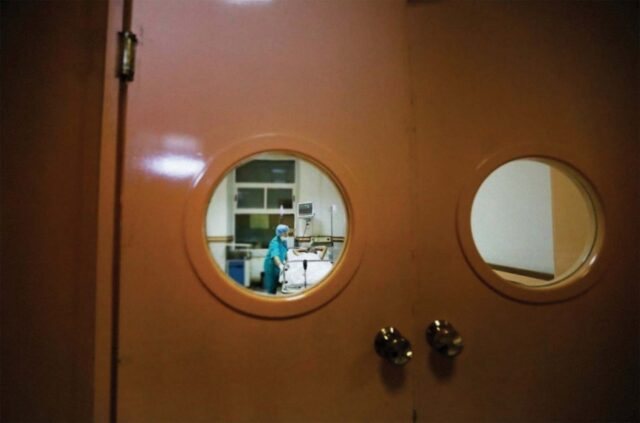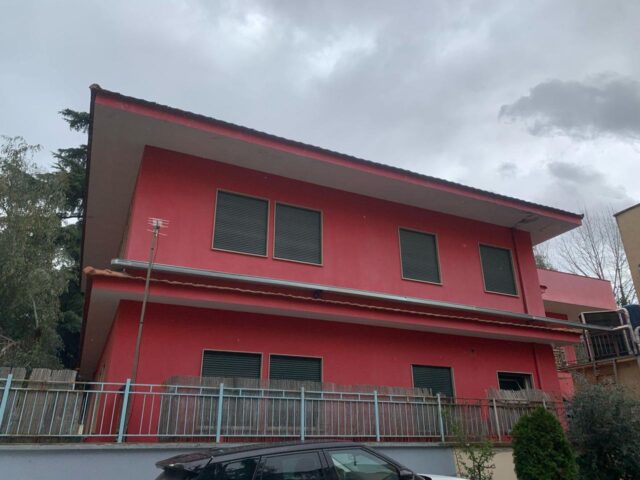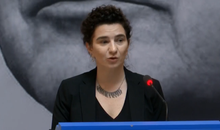
 Flash News
Flash News
The Ministry of Agriculture confirms 4 outbreaks of cattle plague in different areas of Albania
Suffering cardiac arrest, vacationer dies on Qerret beach
Alarm on the coast/ Elderly woman from Kosovo risks drowning!
Shot in the head, former Albanian policeman dies after 3 days
Renowned QSUT doctor passes away
The Albanian mental health treatment system suffers from chronic problems

The small number of doctors, the lack of alternative centers and insufficient capacities prevent proper treatment for people suffering from mental health problems in Albania, while the entire burden remains on the family members.
At the "Mother Teresa" University Hospital Center in Tirana, hundreds of patients are admitted and discharged every day, but it is different in a separate center within the perimeter, where 18 men have been staying there for more than a decade.
The center consists of two buildings painted red with fully shuttered shutters and operates as a single institution – although the Ministry of Health considers them to be two residential support homes for chronic mental health patients in Tirana.
Support home residents are diagnosed with schizophrenia – one of the serious mental health illnesses. They circulate and interact freely within the comfortable but insufficient facilities to address the growing needs for the treatment of chronic mental health patients in Tirana. According to the leaders of the center, women and girls with similar problems are forced to address them to other cities in the country.
With a centralized tradition in mental health treatment, Albania has been struggling in recent years to reduce the number of beds in psychiatric hospitals and add alternative services such as community centers or support homes for its patients.
And yet, such centers are few in number and operate under the conditions of inadequate capacities and lack of specialist doctors. Another group of patients with mental health problems continues to face discrimination as they are locked inside prisons against the recommendations of human rights organizations and the World Health Organization.
Psychiatrists told BIRN that the mental health service continues to remain one of the most problematic sectors of the health system in Albania.
"Reducing the number of beds and days in psychiatric hospitals should be accompanied by the establishment of community services, with the training of family doctors," says psychiatrist Neli Demi, implying that this has not been done. In these conditions, Neli thinks that "only the burden of family members" is increased.
One doctor for 100,000 inhabitants

The health system in Albania has four psychiatric hospitals located in Elbasan, Vlorë, QSUNT and Shkodër with a total of 600 beds. According to the Ministry of Health, these hospitals had a total of 3056 hospitalizations during 2023 with an average number of days of stay ranging from 14 days in the Psychiatric Hospital of Elbasan to 31 days in the Elbasan Psychiatric Hospital.
The Psychiatry Service at QSUT holds the largest share of beds with almost 60% of the total, although it has a limited number of 90 beds.
Anita ended up in the Psychiatry Service at QSUNT in 2017 after a cyclothymic disorder, but stayed for a shorter time than she was told. She told BIRN seven years later that she was hospitalized for suicidal tendencies, but was forced out of the hospital early.
"I stayed two weeks out of the three weeks that I was initially notified. Due to the overcrowding of the hospital, they had to take out the patients who had recovered the most and I was one of them. I came out without completing the entire proper treatment cycle," she says.
Multidisciplinary mental health services are also overburdened. They are mainly concentrated in the cities where psychiatric hospital services are also located, leaving a large part of the country's territory uncovered.
The Ministry of Health told BIRN that currently 10 community mental health centers and 14 support homes have been set up, located mainly in Tirana, Elbasan, Vlorë, Korçë and Shkodër. Such services are also offered in Kavajë, Berat and Gramsh.
One of the largest community mental health centers is located in the Central Polyclinic of Tirana, and the door of the psychiatrist's office, Arjana Rreli, does not stop falling. This center covers a population of 400 thousand inhabitants and has only 4 psychiatrists.
"On average, I make 40 visits a day. One psychiatrist for 100,000 inhabitants," says Rreli.
The psychiatrist also added that Tirana is a city with serious mental health problems and needs more specialist doctors and increased services. However, psychiatry is not a branch preferred by medical specialists.
"It is a branch that is not preferred by specialists to take up, although fortunately we, as doctors-psychiatrists, are comparatively the ones who leave the homeland less," she added.
The situation is similar in the city of Vlora in the south of the country, where only one psychiatrist serves in the community mental health center.
The psychiatrist of this center, Stiljano Lepuri, told BIRN that he alone had made 9,400 visits during the past year, or an average of about 26 visits per day.
"We have a lack of medical capacity, because for example I am a psychiatrist who covers the entire district of Vlora, imagine the burden," he added.
Psychiatrist Neli Demi emphasizes that the reduction of beds in psychiatric hospitals has not been accompanied by the rise of other services, including regional hospitals in the treatment of mental health.
"It could be done in parallel, to lower the beds in the psychiatric hospital and to put the beds in the regional hospitals, this is the recommendation from the World Health Organization for many years," suggests Neli Demi for BIRN.
Albanian legislation guarantees to persons suffering from mental health disorders equal treatment and without discrimination, in function of respecting physical integrity and human dignity. And yet, Albanian governments have failed for decades to provide a special medical facility for people with mental health disorders who have committed a criminal offense and have a measure of court-ordered treatment.
After the closure of the notorious prison of Zaharia in 2021, the people with the measure of forced treatment were distributed between the prison of Saint Kolli in Lezhë and that of Drenova in Korçë, but their situation has not changed.
"The problem of the special institution is a chronic problem. There has never been a special institution in technical terms, mainly institutions such as Zaharia, which was closed, or, as it is claimed, the prison of Saint Kolli," says Demi to BIRN.
The lack of a special institution hurts doubly the family members of people with mental health problems, who are involved in episodes of domestic violence or other criminal cases.
In 2020, during the pandemic period, Romina's mother ended up in the "Ali Demi" prison in Tirana for a year and a half because of violence against family members. The woman has been suffering from schizophrenia for 20 years and years ago she stayed for long periods in the Psychiatry service at QSUT.
"Over time, it was a big fight, because the Psychiatry service at QSUNT refused to cure him," says the daughter.
Romina also added that it was impossible to find a residential center for her mother, who returned to the family after being released from prison.
"Persons with mental health problems who perpetrate domestic violence mostly go to prison, while they should go to residential inpatient centers, which are lacking," she added.
Episodes of the involvement of people with mental health problems in cases of domestic violence are frequent and one of the main problems faced by the local government violence prevention structures. The lack of specialized centers for their treatment also burdens family members.
Ines L eskaj from the "Albanian Women's Empowerment Network" raises the concern that victims of gender-based violence, who suffer from mental health problems at the same time, are not accepted in the usual shelters. Leskaj says that they are treated like that famous expression "to whom to leave the ball".
"The shelter absolutely cannot keep her, as she puts other women's lives at risk. Allegedly, the police take him into custody, but the police have nowhere to keep him and he ends up on the street," she said.
Leskaj emphasizes that even community mental health centers do not offer long-term and decent solutions for the safety and quality of life of these people.
"We continue to remain in the same problem, which is not a small problem, the issue of support with the necessary budget to follow in the long term the reintegration services that these people need," she concluded./BIRN
Latest news


Demand a recount of votes in Tirana, the Court dismisses Alimehmet's case
2025-06-12 12:22:08
Suffering cardiac arrest, vacationer dies on Qerret beach
2025-06-12 12:05:48

The market is "demanding" a minimum wage increase
2025-06-12 11:52:37

Alarm on the coast/ Elderly woman from Kosovo risks drowning!
2025-06-12 11:25:51
The hearing for "Golden Bullet" is postponed due to the lack of lawyers.
2025-06-12 11:06:27
The Special Court schedules the hearing for the “Partizani” case
2025-06-12 11:00:42
"We work to steal"/ Berisha releases Rama's video: The first time he is honest!
2025-06-12 10:52:11


US limits non-essential staff at embassy in Iraq after rising tensions with Iran
2025-06-12 10:19:44

Hero in Greece/ Albanian immigrant saves two children from drowning in river
2025-06-12 09:52:46
Albanian Customs Officials Crack Down on Cigarette Smuggling Business
2025-06-12 09:37:17

26 years of freedom! Kosovo marks Liberation Day today
2025-06-12 09:14:19
Clear skies across the country, weather forecast for today
2025-06-12 09:03:08
The level of salaries in construction and tourism remains below average
2025-06-12 08:49:54


Murder in Xibar i Klos/ Hazbi Velsula, the victim's cousin, in custody
2025-06-12 08:23:45
Morning Post/ In 2 lines: What mattered yesterday in Albania
2025-06-12 08:09:51

Bylykbashi: The EPP Assembly adopted the strongest resolution in this forum
2025-06-11 22:46:15
A person is found dead in Klos, suspected of being murdered
2025-06-11 22:33:38


Rape the cleaning worker in Athens, the Greek police declare the Albanian wanted
2025-06-11 21:30:13
Disappointment with Latvia, Elseid Hysaj reacts after disappointing transfer
2025-06-11 21:15:08

EU: New package of sanctions against Russia focuses on energy and finance
2025-06-11 20:51:17

Scandal in Lezhë/ The apartment is covered by sewage
2025-06-11 20:37:59
Rural schools left behind in the use of digital tools
2025-06-11 20:09:51
Kosovo bans import of sheep and goats from Albania
2025-06-11 20:01:17
Shot in the head, former Albanian policeman dies after 3 days
2025-06-11 19:41:08


Weather-shaping factors: How cloud-dwelling microbes affect our lives
2025-06-11 19:01:22



Immigration policies/ Famous TikToker leaves the US
2025-06-11 18:20:30







Renowned QSUT doctor passes away
2025-06-11 17:03:30
Photo/ Van catches fire on the Fier-Lushnje highway
2025-06-11 16:54:35
Kurti confirms agreement with US on immigrants: We will accommodate 50 people
2025-06-11 16:42:50
Poll/ Do you believe that the vote recount will change the result of May 11?
2025-06-11 16:31:21
Martin Can's murder, 6 people testify in closed-door session
2025-06-11 16:28:14
The silent tragedy! 56 suicides have been recorded in the country since January
2025-06-11 16:20:06
First case of monkeypox identified in Albania
2025-06-11 16:13:18


Ukraine repatriates bodies of soldiers killed by Russia
2025-06-11 15:37:13



Menopause, tips for a healthier transition
2025-06-11 15:03:00
A person was violently robbed, a serial thief was arrested in Durrës
2025-06-11 14:48:43

Tensions with Russia return, Poland arrests 28-year-old for spying for Moscow
2025-06-11 14:33:58
Foreign tourist dies in Saranda, initial suspicions
2025-06-11 14:14:38
A person was injured with a knife in Kuçova, the 26-year-old was arrested
2025-06-11 14:08:51
Nuclear tensions rise as Iran and US disagree on date for talks
2025-06-11 14:00:32

'Sterilization' trial postponed, here's when the next hearing will be held
2025-06-11 13:44:18
Greece considers banning burqa in universities
2025-06-11 13:36:04

Curvy roads and looking at your phone make you nauseous? Find out why
2025-06-11 13:20:18


List/ What are the teams qualified so far for the 2026 World Cup?
2025-06-11 12:54:56


OVERDOSE
2025-06-11 12:38:27
Kosovo government rejects US request to shelter immigrants from third countries
2025-06-11 12:32:01

By-elections in 3 municipalities remain in Rama's hands, despite the law
2025-06-11 12:12:33

The attempt to constitute the Kosovo Assembly fails for the 30th time
2025-06-11 11:57:14


Former Rector of the University of Tirana, Dhori Kule appears in SPAK
2025-06-11 11:35:07
Missing for six days, 20-year-old man found dead in Korça (NAME)
2025-06-11 11:28:27
6-year-old boy found dead on the banks of the Shkumbin River
2025-06-11 11:20:20

Shooting in "Ali Dem", 26-year-old injured, 4 wanted
2025-06-11 11:00:41

"X" with Latvia sparks debate, Sylvinho's dismissal is demanded
2025-06-11 10:41:31
"Furious" fans: Duka sells matches, Silvinjo is a puppet!
2025-06-11 10:27:17
KAS begins vote recount in Dibra District
2025-06-11 10:20:13
